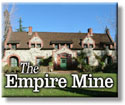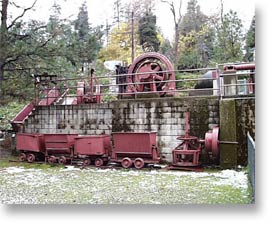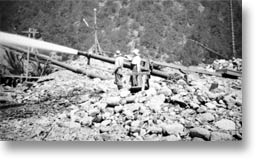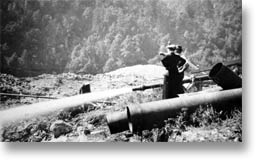                  
|


Visit
the Historic Empire Mine
click here
It
is believed that millions of dollars of gold, depending on current
value, still lays buried deep in the earth below the quaint town
of Grass Valley. Prospectors from Oregon in search of gold and
emigrants from the east looking for fertile homeland settled in
Grass Valley between 1848 and 1849. As with all the mining camps
and towns along what would become Highway 49, gold fever created
an instantaneous population explosion. Though early miners sought
their riches in the streams, it was only by accident that the
true wealth of Grass Valley was discovered. Legend has it a miner
in search of his missing cow stubbed his toe and dislodged a large
rock which when he picked up gleamed with gold. Not too much later
another man searching for stones to construct a chimney discovered
a rich vein of gold quartz. The rest, as they say, is history.
 By
1855 the town was prospering and growing when it suffered two
significant setbacks. A fire that swept through the town destroyed
300 buildings. Rebuilt the town faced a worse disaster, the ease
of accessing the gold had become more and more difficult. Tenacity
and improved techniques in hardrock mining allowed Grass Valley
to once again prosper by the 1860s. By
1855 the town was prospering and growing when it suffered two
significant setbacks. A fire that swept through the town destroyed
300 buildings. Rebuilt the town faced a worse disaster, the ease
of accessing the gold had become more and more difficult. Tenacity
and improved techniques in hardrock mining allowed Grass Valley
to once again prosper by the 1860s.
150 million dollars in gold was mined from two mines,
the Empire mine, and the North Star Mine in their 100 years of
service. Nevada County in total produced an unbelievable 440 million
dollars in gold during that same time period. Both mines were
closed in 1956 and are now a park and a museum open to the public.
Grass Valley was one of the fortunate cities who's economy based
on its mining efforts was able to prosper even through the Great
Depression until the mines were closed by the war production board
because of the war in 1940.
 Grass
Valley today still proudly displays its early architecture and
history as a living museum that coexists with a thriving, modern
business center, that has maintained its cultural identity and
remained a strong family oriented city. Grass
Valley today still proudly displays its early architecture and
history as a living museum that coexists with a thriving, modern
business center, that has maintained its cultural identity and
remained a strong family oriented city.

|




 By
1855 the town was prospering and growing when it suffered two
significant setbacks. A fire that swept through the town destroyed
300 buildings. Rebuilt the town faced a worse disaster, the ease
of accessing the gold had become more and more difficult. Tenacity
and improved techniques in hardrock mining allowed Grass Valley
to once again prosper by the 1860s.
By
1855 the town was prospering and growing when it suffered two
significant setbacks. A fire that swept through the town destroyed
300 buildings. Rebuilt the town faced a worse disaster, the ease
of accessing the gold had become more and more difficult. Tenacity
and improved techniques in hardrock mining allowed Grass Valley
to once again prosper by the 1860s.  Grass
Valley today still proudly displays its early architecture and
history as a living museum that coexists with a thriving, modern
business center, that has maintained its cultural identity and
remained a strong family oriented city.
Grass
Valley today still proudly displays its early architecture and
history as a living museum that coexists with a thriving, modern
business center, that has maintained its cultural identity and
remained a strong family oriented city.